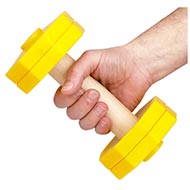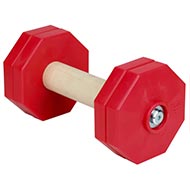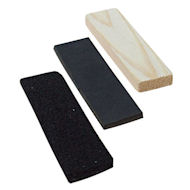10 Useful Tips for Dog Obedience Training
Dog Obedience Training
Obedience means good behavior, servility, and humility. Dog
obedience competition is a contest in which dogs show how they are
trained to obey their owners. They perform basic training commands,
seek for and bring a variety of items, jump over a barrier. The
purpose of these competitions is to show dogs with the right
behavior, able to follow it, not only at home, but also in public
places where they can encounter a lot of people and other animals.
Dogs are allowed to take part in the competition if they can
correctly perform the commands, have trained
endurance, able to fetch things, and can understand their owner
perfectly. Often dogs trials include competitions when the dog and
its owner have to do the exercises to the music and get into the
rhythm. Dogs that are not so musically minded, demonstrate their
skills in tracking, picking a sample; they search for and identify
the person by the smell. Obedience training course can be taken by a
dog of any breed, which is not less than six month old.
Click on the image to view the product's details
Professional Dumbbell for Dogs
Obedience competitions have three levels that differ in complexity.
The first introductory level includes teaching dogs to walk near its
owner feet when on a leash, and without it, obey the command to come
up to the owner, the ability to stand still and wait. The second
open level includes more complicated tasks, e.g. fetching things and
obeying commands from a distance. The third level includes very
complicated obedience exercises, and the dog's ability of tracking and following a trace.
Dog obedience training course includes:
- Perform the command "To me!" - Approach, bypassing, landing near a
feet of the handler.
- Preform the command "Heel" - rack movement with changes in tempo,
turning on the move and on the site, stop.
- Perform the command "Walk!"
- Perform commands"Stop!", "Down", "Sit!" Shutter training.
- Perform of the above mentioned commands when moving.
- Perform combinations of commands - to stand, lie down, sit in the
distance.
- Perform commands "Forward!", "Left", "Right!".
- Learn to jump over the barrier of one meter high.
- Fetching items - wooden dumbbell, specified direction.
- Fetching things - metallic object, barrier.
- Teaching to search for things, pick sample items by smell.
Usually this is a group training, it takes about fifteen to twenty
days. If the dog is trained individually, the number of training
sessions is not limited. Dogs that have successfully completed the
training course and passed the exam, receive a special diploma.
Now let's have a look at the exercises that the dogs have to fulfill
in obedience competitions:
1. Dogs are placed in a group at a distance of three meters from
each other. The owners give the command "Sit!", and then leave the
dogs for two minutes, and then return. Dogs that get excited and
nervous, or move from their seats, are given less points. The animal
is allowed to look around if there are some distractions.
2. The dogs are placed in a group for four minutes, with the use
of distractions. Commands: "Lie down!", "Stand!", "Sit". The dog must
sit down near the owner then it is given the command "Down!" and the
owner leaves. During these four minutes, while the dog is lying, the
staff of the competition will try to provoke it to get up. The dog
should avoid these distractions and calmly endure this time. After
that, the owner returns, from a distance of three meters gives the
command "Next!. The points are lower if the dog sits down, stands
up, begins to crawl and bark, in general, shows inconsistency and
anxiety.
3. It is checked how the dog performs the command "Heel". Without a
leash, the shoulder on the left leg knee level, it should follow the
owner who moves slowly, then quickly, stops, turns to different
directions. If a dog follows his master at the distance more than half
a meter or even runs away - the task is not completed.
4. Checking commands "Stand", "Sit!", "Down", "Next!" in motion. Dog
and owner are moving on a platform. The handler commands "Stop!",
the dog must sit down, but the owner must keep moving. Once again,
he approaches the dog and while moving, commands "Next!", and they
continue walking together. Then the dog is given commands "Sit!" and
"Down!" Points are lower, if the dog does not stop or performs the wrong command. The minimum to
pass the test is to perform two commands correctly. The command
"Heel" is given special attention.
5. Checking command "To me!" when sitting and lying down. The dog is
left in place in the "down" position and the handler moves away from
it about thirty meters. Then he calls the dog, and as soon as it runs a
third part of the way to him, the dog is stopped. A minute later the
dog is given the command "To me!" again, and then two-thirds of the
way are over the dog is given the command "Down!". And again in some
time "to me!". When the dog is given the first command it is allowed to
say its name. The dog should move at a trot. If the dog moves slow
it is considered to be a mistake.
6. The dog is sent in the given directions and has to perform
commands "Down!", "To me!", "Go!", "Right", "Left!".
 7. Checking a dog's skill to find and bring the items while
performing commands, "Go!", "Stop!", "Right", "Left", "Look!",
"Give!". Wooden dumbbells are arranged in a single row, the distance
between them is five meters. From a distance the owner sends the dog
to the left or right-hand dumbbell, and orders to take it and bring
it. Special attention is given to guide commands and readiness with
which the dog performs them, her speed, and intelligence with which
the dog chooses the shortest path. Points are lower, if the dog
begins to bite or chew a dumbbell.
7. Checking a dog's skill to find and bring the items while
performing commands, "Go!", "Stop!", "Right", "Left", "Look!",
"Give!". Wooden dumbbells are arranged in a single row, the distance
between them is five meters. From a distance the owner sends the dog
to the left or right-hand dumbbell, and orders to take it and bring
it. Special attention is given to guide commands and readiness with
which the dog performs them, her speed, and intelligence with which
the dog chooses the shortest path. Points are lower, if the dog
begins to bite or chew a dumbbell.
8. Jump over a barrier to take a metal item while performing
commands "Barrier", "Fetch!", "Give!". The owner and dog are three
meters away from a barrier. A dumbbell is thrown over the
barrier and the dog is given the command "Stand!". The dog jumps
over the barrier, takes the dumbbell and brings it to the owner,
jumping over the hurdle. It is not allowed that the dog touched the
barrier and did not make the return jump.
Click on the picture to see the product details
Dog Training Jump for Schutzhund
 9. Check the dog's sense of smell when performing commands, "Look!",
"Fetch!", "Give!". Wooden bar with the starting number, which was in
the hands of the owner for a certain time, is placed among similar
objects with the distance of five to ten meters apart. When a
command is given, the dog must find the required block and bring it.
The task should be completed in 30 seconds. The dog is not allowed
to sniff and touch the object before performing the exercises. If he
does that, the task is not completed.
9. Check the dog's sense of smell when performing commands, "Look!",
"Fetch!", "Give!". Wooden bar with the starting number, which was in
the hands of the owner for a certain time, is placed among similar
objects with the distance of five to ten meters apart. When a
command is given, the dog must find the required block and bring it.
The task should be completed in 30 seconds. The dog is not allowed
to sniff and touch the object before performing the exercises. If he
does that, the task is not completed.
10. Checking how a dog can perform commands given from the distance.
The handler makes the dog lie and goes away from him about fifteen
meters. From that distance he gives orders to the dog. Special
attention is given to the speed with which the dog performs the
commands. When changing body position the dog should not move
forward at a distance more than his body length.
Related topics:
Top 10 Dog Training Rules
How to Train a Dog to Seek and Find?
How To Motivate My Dog?
Dog Training Tips for Professionals, TOP 10
Top 10 Dog Products Recommended for Dog Owners


 7. Checking a dog's skill to find and bring the items while
performing commands, "Go!", "Stop!", "Right", "Left", "Look!",
"Give!". Wooden dumbbells are arranged in a single row, the distance
between them is five meters. From a distance the owner sends the dog
to the left or right-hand dumbbell, and orders to take it and bring
it. Special attention is given to guide commands and readiness with
which the dog performs them, her speed, and intelligence with which
the dog chooses the shortest path. Points are lower, if the dog
begins to bite or chew a dumbbell.
7. Checking a dog's skill to find and bring the items while
performing commands, "Go!", "Stop!", "Right", "Left", "Look!",
"Give!". Wooden dumbbells are arranged in a single row, the distance
between them is five meters. From a distance the owner sends the dog
to the left or right-hand dumbbell, and orders to take it and bring
it. Special attention is given to guide commands and readiness with
which the dog performs them, her speed, and intelligence with which
the dog chooses the shortest path. Points are lower, if the dog
begins to bite or chew a dumbbell.